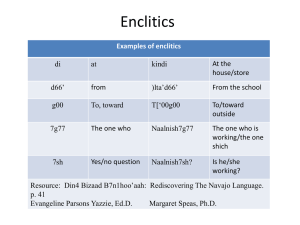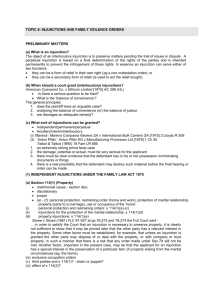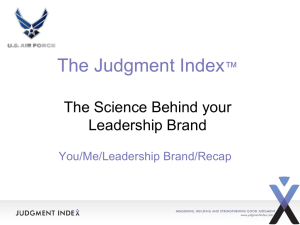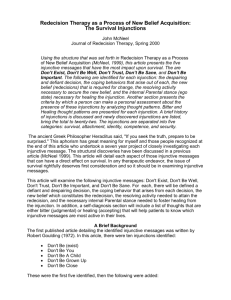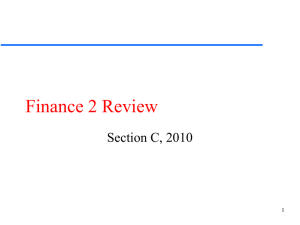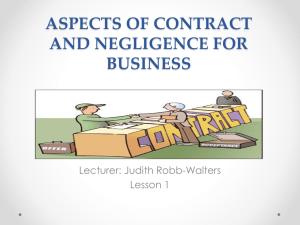employment law - Limerick Solicitors` Bar Association
advertisement
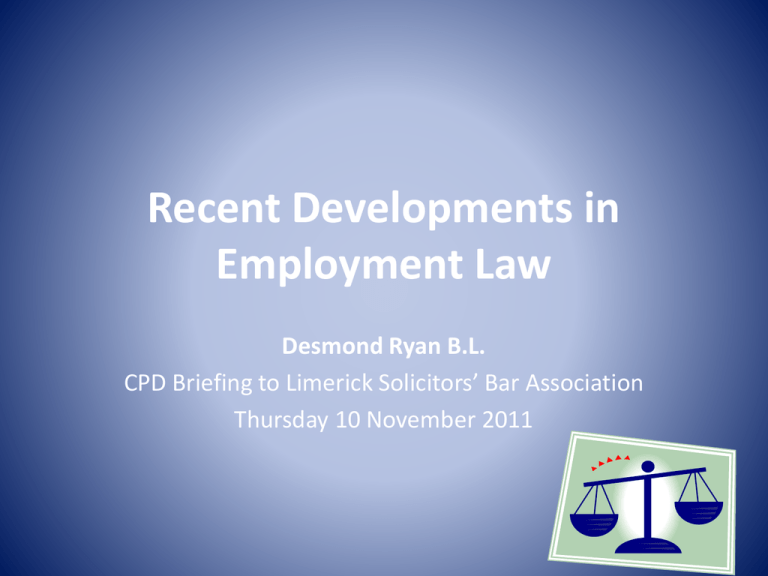
Recent Developments in Employment Law Desmond Ryan B.L. CPD Briefing to Limerick Solicitors’ Bar Association Thursday 10 November 2011 Overview • The Employment Injunction: Where are we Now? – – – – – – • Fixed-Term and Part-Time Employees: Emerging Principles from Litigation – – – • Injunctive Relief sought in Fixed-Term Work Act context: judgments of the High Court (Hogan J) in July 2011 in McGrath and Holland The High Court decision in HSE v Umar (April 2011) Part-Time Workers and the European Dimension to Catholic University School v Dooley (July 2010 and May 2011) Key recent case law concerning bullying, harassment and stress at work – – • Rules of the Superior Courts (Costs) 2008 (S.I. No. 12 2008) Fall-out from Emo Oil and Burke: what are the new tests? Recent Article by Charleton J on injunctions and ‘over-loose discretion’: an important insight into High Court judicial thinking in this area Restrictive Covenants and Injunctive Relief: this year’s High Court judgment (Dunne J) in Net Affinity (March 2011) The ‘Springboard’ Injunction: AIB v Diamond (High Court, Clarke J, October 2011) Recent examples of injunction proceedings The High Court Judgments in Sweeney (March 2011) and Delaney (April 2011) The relevance of penalisation claims under s.27 of the Safety, Health and Welfare at Work Act 2005 Developments concerning Dismissal and Redundancy – – – Relevance of Croke Park Deal in attempts to injunct termination in public sector The High Court judgment in Panisi (July 2011) Large Awards in EAT as claimants’ losses mount S.I. No. 12 of 2008 and Costs Implications • Rules of the Superior Courts (Costs) 2008 (S.I. No. 12 2008) • Rule 1 inserts an amendment to Order 99 (4A) RSC which now includes the following provision: – “The High Court or the Supreme Court, upon determining any interlocutory application, shall make an award of costs save where it is not possible justly to adjudicate upon liability for costs on the basis of the interlocutory application.” • Implications – chilling effect on injunction applications? Impact of Emo Oil and Burke • In Nolan v Emo Oil [2009] 20 ELR 122 the employee claimed that he had been unfairly selected for redundancy and he sought interlocutory relief restraining the implementation by the employer of this decision. Laffoy J, emphasising that the question of whether a redundancy was valid was one that was to be determined by the specialist statutory jurisdiction of the Employment Appeals Tribunal, concluded that, on that basis, the High Court had no jurisdiction to consider any aspects of that issue. • Following on from Emo Oil came Burke v Independent Colleges Ltd (t/a Independent Colleges) [2010] IEHC 412 (High Court, 5 November 2010) – this is amongst the most significant employment injunction cases in the past year. • Burke , by contrast to Emo Oil, involved a situation where an employee sought injunctive relief in the context not of the fact of redundancy itself, but of the procedures involved in that decision-making process. (…./) The Burke Judgment • The key passage of the judgment of Laffoy J in Burke is that in which Emo Oil is distinguished: – “If the plaintiff was constrained to argue that there was no basis, or that he was improperly selected, for redundancy, for the reasons set out in the Nolan case, I consider that the argument would not form the basis of a remedy at common law or in equity and that he would be constrained to pursue a remedy in accordance with the statutory code. However, given that he can rely on the argument that [the putative termination letter] was not effective to terminate his employment either on a contractual basis or on the basis of statutory redundancy, he is not so constrained as regards pursuing relief outside the statutory redundancy code.” • Comments and discussion Article on Injunctions by Mr. Justice Charleton • This article is available at www.jsijournal.ie • Citation: Mr. Justice Peter Charleton, “Employment Injunctions: An OverLoose Discretion” [2009] 2 JSIJ 1 • Key passages in analysis of Charleton J (pp. 24-25): – “My conclusion, therefore, is that those who choose the wrongful dismissal option, part of and preliminary to an application for an interlocutory injunction in the High Court, are possibly not choosing the best remedy. …The remedies under the Unfair Dismissals Acts, 1977 to 2007 are much more satisfactory.” – “In granting injunctions in respect of a breach of fair procedures, the High Court should take a real view as to what procedures are available to personnel managers: to continue the move towards the direction of a plenary hearing as a means of resolving internal employment issues is perhaps to do a disservice to the proper administration of business. Those who have suffered such unfairness have a clear statutory remedy.” – Comment and analysis Injunctions and Restrictive Covenants • Net Affinity Ltd v Conaghan and Revmac Limited t/a Avvio [2011] IEHC 160 (High Court, Dunne J, 22 March 2011) – Non-compete clause considered in light of principles articulated in Murgitroyd v Purdy [2005] 3 IR 12 – Reference also made to TFS Derivatives Ltd. v Morgan [2004] EWHC 3181 (QB) (15 November 2004) – Clause impugned on basis of no geographical limitation – Injunctive relief granted preventing the former employee from breaching her duty of confidentiality to the employer as set out in express terms in her contract of employment, and preventing both defendants from approaching, soliciting or dealing with any existing customers of the plaintiff employer. – Comments and analysis ‘Springboard’ Injunctions • The approach of the High Court (Clarke J) last month in AIB v Diamond (14 October 2011, Record No. 2011 No. 8022 P) • Nature of ‘springboard’ injunctions • Fiduciary elements of employment relationship • Application of Net Affinity v Conaghan • Comments and Analysis Other Recent Examples of Injunction Proceedings – Other Recent injunction proceedings before the High Court have included: • Mullin v Brown Thomas (See The Irish Times, 25 August 2011) • McSorley v Kilkenny City Vocational School (See The Irish Times, 25 August 2011) • O’Domhnaill v HSE (See The Irish Times, 10 June 2011) • Scanlon v Irish Canoe Union Ltd (See The Irish Times, 14 May 2011) • Long v Harvey Norman Ltd. (See The Irish Times, 2 April 2011) • Craig v FÁS (See The Irish Times, 12 October 2011) Injunctions and the Fixed-Term Work Act • • McGrath v Athlone Institute of Technology [2011] IEHC 254 (High Court, Hogan J, 14 June 2011): Plaintiff sought interlocutory injunction to restrain termination in circumstances where he had Labour Court proceedings in being to determine whether he should be awarded a CID. Key passage in Hogan J’s judgment entitled “The Appropriate Test for an Interlocutory Judgment in Employment Matters”: • – “[L]et us assume that the Labour Court were ultimately to find for the plaintiff and that the practical effect of such a ruling was that his employment could not be terminated at will. If that were indeed the situation, then it would follow that as the Labour Court has no jurisdiction to grant him interim relief, there might be a risk that a favourable decision with the consequence of precluding termination in the manner presently proposed would come too late to be of any practical benefit to the plaintiff, given that the termination is imminent. The real question is whether this Court would enjoy a jurisdiction to grant an injunction in aid of the Labour Court in circumstances where the plaintiff’s right to secure the benefit of that decision would otherwise have been wholly undermined. – In my judgment, in that situation this Court would enjoy such a jurisdiction, not least by reason of the inherent full original jurisdiction which this Court enjoys to determine all questions of law and fact by virtue of Article 34.3.1 of the Constitution.” – Potential of the above passage for future cases? • (…./) Injunctions and the Fixed-Term Work Act • Hogan J then turned to consider whether this was an appropriate case in which to grant injunctive relief. Referring to both Maha Lingham v HSE [2006] ELR 137 and Sheehy v Ryan [2008] 4 IR 258. Hogan J concluded that even if the Labour Court were to deem the plaintiff to have attained a CID, this would place him in the same situation as if he were a permanent employee whose “contract can be terminated at will….If the fairness of that dismissal is to be adjudicated, this can only be done through the mechanism of the Unfair Dismissals Acts” (per Hogan J, at [24]). • Three days later, the Labour Court granted a CID in this and three other lecturers’ cases in… • Athlone Institute of Technology v Hogan FTC/10/38 (Labour Court, 17 June 2011) • A second judgment of Hogan J then followed in: • Holland v Athlone Institute of Technology [2011] IEHC 254 (High Court, Hogan J, 27 July 2011): Hogan J ruled that the Croke Park Deal does not create enforceable legal rights for an individual public sector employee. Conclusions on Injunctions • Mounting judicial caution expressed towards injunctive relief being granted in employment cases – evident both in judgments and extrajudicial writing • Costs implications have intensified • Case law demonstrates high threshold to be met • And yet…. – “As Gene Wilder in Mel Brooks’ Young Frankenstein says when he sees the monster stirring on his lab table: “It’s alive”” (Oisin Quinn S.C., paper delivered to Employment Bar Association, 5 May 2011). Managing Fixed-Term Contracts • The approach of the High Court in HSE v Umar [2011] IEHC 146 (07 April 2011) • Defence of objective justification for use of successive fixed term contracts in context of appointment of consultants. • Hedigan J analysed in detail the approach of the Labour Court in Health Service Executive v Khan [2006] ELR 313, where the Labour Court adopted a “purposive” interpretation of s.9 of the 2003 Act, holding that employer must establish that the reason relied upon as constituting objective grounds was the operative reason for the failure to offer a CID at the time the fixed-term contract was renewed. This approach was expressly disavowed by Hedigan J in Umar, and the Court allowed the appeal on a point of law, declaring that objective justification did provide a defence in this case. • Key lessons from the case law Part-Time Workers • Key European-related developments this year include the treatment afforded to the Part-Time Work Directive in Catholic University School v Dooley [2010] IEHC 496 (20 July 2010) • High Court held that part-time privately paid teachers could not compare themselves pursuant to the Protection of Employees (PartTime Work) Act 2001 with full-time Department-paid teachers. • In a second judgment delivered on 13 May 2011 Dunne J has ruled that the question at issue in the case concerning the choice of comparator cannot be referred by means of preliminary reference under Art 267 TFEU on the basis that the issue is no longer ‘pending’ before the national court. • Comments and Discussion Recent Cases concerning Bullying, Harassment and Stress at Work • The judgment in Sweeney v Ballinteer Community School [2011]IEHC 131 (High Court, Herbert J, 24 March 2011): another plaintiff win in this area – Vicarious Liability – Aggravated damages • The above case can be contrasted with... O’Toole v County Offaly VEC (O’Neill J) [2011] IEHC 141 (15 April 2011): plaintiff lost on all grounds, with O’Neill J rejecting claims of harassment but also finding that plaintiff failed to put employer on notice of complaints • • Delaney v Central Bank of Ireland [2011] IEHC 212 (High Court, Laffoy J, 15 April 2011) – Employer had prohibited plaintiff from returning to work on basis of Report obtained from Consultant Forensic Psychiatrist. – High Court declared the decision of the Bank in this respect to be null and void on basis of lack of fair procedures. Comments and Analysis The Relevance of Penalisation claims under s. 27 of the 2005 Act – St John’s National School v Akduman [2010] 21 ELR 301 Key Developments concerning Dismissal and Redundancy • Link to discussion above of the judgment of Hogan J in Holland v Athlone IT (Croke Park Deal does not create enforceable legal rights for an individual public sector employee) • High Court judgment in Sharma and Saharan [2010] ELR 262: one year’s service requirement deemed to apply to penalisation cases under 2005 Act • Redundancy: The High Court judgment in Panisi v JVC Europe Ltd ([2011] IEHC 279, 27 July 2011, Charleton J) • Large Awards in EAT as claimants’ losses mount: managing expectations on both sides... Remedies in UD litigation • • • • Compensation Re-instatement Re-engagement Re-engagement awarded this year in Purcell v AIB (See The Irish Times, 10 February 2011) • EAT Annual Report 2010: – The Tribunal awarded compensation amounting to €3,485,898.25 in 217 cases last year. – The average compensation awarded by the Tribunal was €16,064.05. – Re-instatement was ordered in just 6 cases. – Re-engagement was ordered in just 3 cases. Thank You! • Follow-up questions are very welcome: • e: desmondryan@lawlibrary.ie • t: +353 1 817 2378 • m: 086 341 2589 Desmond Ryan B.L. 10 November 2011


